- Home
- Peter S. Beagle
The Magician of Karakosk, and Other Stories Page 3
The Magician of Karakosk, and Other Stories Read online
Page 3
Once I asked him, “What would you do if you weren’t a bard? If you just suddenly couldn’t make up songs anymore?”
I thought I knew him well enough to ask, but he stopped in the road and gaped at me as though he’d never seen me before. That was the only time I ever saw him looking amazed, startled about anything. He mumbled, “You don’t know.”
I stared right back at him. I said, “Well, of course I don’t know. I didn’t know a bloody thing about being a bard, not how it is, you won’t ever talk about that. All I know is what you like to eat, where you like to sit when you sing. Maybe you think that’s all a hill girl from Davlo can understand. Maybe it is. You’ll never know that either.”
Sirit Byar smiled a real smile then, not the almost-smile he wore for everyone always. “Listen to the songs, big girl. It’s all in the songs, everything I could tell you.” We walked along a way after that, and by and by he said, “A bard always hoards one last song against the day when all the others go. It happens to every one of us, sooner or later—you wake up one morning and it’s over, they’ve left you, they don’t need you anymore. No warning. No warning when they flew into you, no warning when they fly away. That’s why you always save that last song.”
He cleared his throat, spat into the road, rubbed his nose, looked sideways at me. “But you have to be very careful, because a bard’s last song has power. You never tell that song; you never sing it anywhere; you keep it for that day when it’s the only song left to you. Because a last song is always answered.” And after that he hardly talked at all for the rest of the day.
He taught me a little about playing the kiit, you know. I’m sure he did it just because he’d never found anyone besides him who could even handle the thing. I’m no musician—I can’t do what he could do, but I know how he did it. Someday I’d like to show someone how he played, just so it won’t die with me. Not that he’d have given one tiny damn, but I do.
Every so often we’d strike a song competition, a battle of bards, especially in the southwest—it’s a tradition in that country to set poets a subject and start them outrhyming one another. Sirit Byar hated those things. He’d avoid even a town where we usually did well if he heard there was a contest going on there. Because once he was recognized, he never had a choice—they’d cancel the whole event if he didn’t enter. He always won, but he was always cranky for days afterward. Me, I liked the song tourneys—we ate well those days, and drank better, and some of the townsfolk’s celebration of Sirit Byar was for me, too, or anyway it felt so. I was proud as any of the Queen’s ladies to walk beside him in the street, holding the kiit so people could see the flowers woven in and out between its strings. And whenever Sirit Byar looked down through all the fuss and winked at me, bard to bard almost—well, you imagine how it was, chicken-wrist. You imagine this big freak’s insides then.
No. Oh, no. Get that out of your head before it ever gets in, if you know what’s good for you. I was eleven, lugging that kiit, for Sirit Byar, and then twelve and thirteen and fourteen, sleeping close for warmth in fields, barns, sheds, whores’ cribs, and never in all that time. Never. Not once. It wouldn’t have occurred to him.
It occurred to me, I’ll tell you that. Yes, you can gape now, that’s right, I’d be disappointed if you didn’t. Listen to me now—I’ve had three, four times as many men as you’ve had women, for what that’s worth. You think men care about soft skin, perfect teeth, adorable little noses? Not where I’ve been—not in the mines, not on the flatboats, the canal scows, not in the traders’ caravans slinking through the Northern Barrens. Out there, I even get to say, “No, not now, piss off”—can you imagine that at least, chicken-wrist? Try.
I had my first while I was yet on the road with Sirit Byar. Not yet fourteen, me, and sneaking up on myself in every stockpond, every shiny pot, just on the off-hope that something might have changed since the last time. If I’d had a mother… aye, well, and what could the most loving mother have told me that the bottom of any kettle couldn’t? What could Sirit Byar have said, who never looked in a glass from year’s-end to year’s-end? I truly doubt he remembered the color of his own eyes. Now me, I couldn’t remember not knowing I was ugly enough to turn milk, curdle beer, and mark babies, but it hadn’t mattered much at all until that boy at Limsatty Fair.
Ah, gods, that boy at the fair. I can still see him, thirty years gone, when I can’t remember who pleased me last week. Pretty as you like, with lavender eyes, skin like brown cambric, bones in his face like kite-ribs. He was selling salt meat, if you’ll believe it, and when Sirit Byar and I wandered by he looked at me for a moment, and looked politely away, so as not to stare. That’s when I learned that I had a heart, chicken-wrist, because I felt such a pain in it that I couldn’t believe I was still walking along and not falling dead on the spot. We were to make our camp in a field a mile from the fair, and I think I walked backward all the way. Sirit Byar had to grip me by the back of my smock and tow me like a bloody barge.
There was a little creek, and I was supposed to scoop some fish out of it for our dinner. Any hill child can do that, but instead I lay there on my stomach and cried as I’ve never cried in my life, before or since. I didn’t think it was ever going to stop. Leave that out. No. No, keep it in. What do I care?
Sirit Byar had probably been sitting by me for a long time before I felt his hand on my neck. He never touched me, you know, except to help me on the road, or to remind me about holding the damn kiit just so. Once, when I was sick with the white-mouth fever, he carried me and the kiit both for miles until we found a mad old woman who knew what to do. This was different, this was—I don’t know, leave it, just leave it. He said, “Here.”
He took off the Queen’s silken kerchief he always wore around his neck and handed it to me so I could dry my eyes. Then he said, “Give me the kiit.” I just stared at him, and he had to tell me again. “Give it to me, big girl.”
He tuned it so carefully, you’d have thought he was getting ready to play at the black palace once again. Then he set his back against a tree, and began to sing. It wasn’t a song I’d ever heard, and it didn’t sound like one of his. The rhythm wasn’t any I knew, the music was jags and slides and tangles, the words didn’t make any sense. I told you, I had all his songs by heart the moment I heard them, but not that song. I do have a bit of it, like this:
If you hear not, hear me never—
if you burn not, freeze forever—
if you hunger not, starve in hell—
if you will not, then you never shall….
That line kept coming round and round again—“If you will not, then you never shall.” It was a long song, and there was a thing about it made my skin fit all wrong on me. I lay where I was, sniffling away, while Sirit Byar kept singing, and the sun wandered down into twilight, slow as that song. At last I sat up and wiped my face with the Queen’s kerchief, and remembered about our fish. I was moving myself back over to the creek when the music stopped, sudden as a doorslam, and I turned and saw the salt-meat boy from the fair.
He was still so beautiful that it hurt to look at him, but something in his face was changed. Some kind of vague, puzzled anger, like someone who hasn’t been blind long enough to get used to it. But he walked straight to me, and he took my hands and drew me to my feet, and we stood staring at each other for however long. When he began to lead me away, I turned to look back, but Sirit Byar was gone. I don’t know what he had for dinner that night, nor where he slept.
Me, I slept warm on a cold hillside, as they say in the old ballads, and I woke just a minute or two before I should have. The salt-meat boy was up and scurrying into his clothes, and looking down at me with such bewilderment and such contempt—not for me, but for himself—as even I haven’t seen again in my life. Then he fled, carrying his boots, and I lay there for a while longer, to give him time. I didn’t cry.
Sirit Byar was at the creek, breakfasting on dry bread and cheese and the last of our sour Cape Dylee wine. There was
enough laid out for two. Neither of us spoke a word until we were on our way again, bound for Derridow, I think. Finally I said, “The song brought him.”
Sirit Byar grunted, looked away, mumbled something. I stopped right there on the road—he actually walked along a few steps before he realized I wasn’t with him. I said, “Tell me why you sang that song. Tell me now.”
He was a long time answering. We stood there and looked at each other almost the way I’d stood with that salt-meat boy, years and years ago it seemed. Finally Sirit Byar rubbed his hand across his mouth and muttered, “You’re my big girl, and you were so sad.”
And that was how I knew he liked me, you see. Three, almost four full years carrying his instrument, cooking his meals, grubbing up coins from tavern floors, and he’d never said. He turned right around then and started walking on, as fast as his limp would let him, and I hurried after him with the kiit banging the side of my knee. He wouldn’t talk for a long time, not until a rainshower came up and we were huddled in the lee of a hayrick, waiting it out. I asked him, “How does it happen? The song making someone come to you.”
Sirit Byar said, “Where I come from, there are songs for bringing game to the hunter—fish, birds. I just changed one a little for you.”
I started to say, “Please, don’t ever do that anymore,” but I changed my mind halfway through. Whatever came of it, he gave me what I’d wanted most in all my life till then, and no blame to him if I woke from the dream too soon. So instead I asked, “Can you make other things happen with your songs?”
“Little things,” Sirit Byar said. “The great ones who walked the roads before me—Sarani Elsu, K’lanikh-yara”—no, I never heard of them either, chicken-wrist—“they could sing changes, they could call rivers to them, they could call gods, lightning, the dead, not silly lovers.” He patted my shoulder clumsily, I remember. He said, “All songs are magic, big girl. Some are more powerful than others, but all songs are always magic, always. You’ve seen me start our cooking fires in the rain—you remember the time I cured the farmer’s dog that had eaten poison. My songs make little magics, that’s all. They’ll do for me.”
Write that down, remember that he said just that. Remember it the next time you hear someone jabbering about Sirit Byar’s great powers. Little magics. He never claimed anything more than that for himself. He never needed to.
Where was I? The rain let up, and we set out again, and presently Sirit Byar began singing a new song, one he hadn’t yet finished, scrawling it in the air with one huge hand as we walked, the way he did. It ran so:
Long ago,
before there were landlords
long ago,
before there were kings,
there lived a lady
made all out of flowers,
made of honey and sunlight
and such sweet things….
Yes, of course you know it, that one got around everywhere—I’ve heard it as far north as Trodai, just last year. He sang it through for me the first time, the two of us shivering there in the rain, and when the sun came out, we walked on. Neither of us ever said another word about the salt-meat boy, as often as we came again to Limsatty Fair.
After that, something was a bit different between us. Closer, I don’t know—maybe just easier. We talked more, anyway. I told Sirit Byar about the little scrap of a farm where I’d lived, and about how I’d chanced into the Miller’s Joy that night, and that I was worried about my father—we hadn’t been back to Davlo in four years. I asked after him whenever we met someone who’d passed through there, but for all I knew he might have died the day I left. I’d go days at a time without thinking of him at all, but I dreamed about him more and more.
Sirit Byar spoke sometimes of his south-coast town—not much bigger than Davlo, it sounded—and of his older sister, who raised him after their parents’ deaths. Even now I can’t imagine Sirit Byar having a family, having a sister. She set his leg herself when it got crushed between two skiffs and there wasn’t even a witchwife for miles. She married there, and was killed in the Fishermen’s Rebellion, and he never went back. Did you ever hear anyone sing that song of his, “Thou?” Most people think that song’s about one god or another, but it’s not; it’s for his sister. He told me that.
Bedded down one night in the straw of a byre, with an old rishu and her calf for company, I asked him why he’d said that in the Miller’s Joy when he first saw me—“There you are, big girl.” How he knew that I was supposed to go with him and help him and do what he told me—how I knew. Sirit Byar was sitting up across from me, fussing over a harmony on the kiit that never did satisfy him. He answered without looking up, “He told me. The one your folk call Azdak.” I didn’t understand him. Sirit Byar said, “When I came to Davlo. I saw him by the road, and we talked. He told me to watch for you.”
“Azdak,” I said. “Azdak. What would Azdak care about me?”
“He is the god of wanderers,” Sirit Byar said. “He knows his own.” The kiit wouldn’t do a thing he wanted that evening, and he finally set it down gently in an empty manger. He went on, “Your Azdak told me you and I had a journey to make together. I didn’t know what he meant then.”
“Aye, and so we had, sure enough,” I said. “Where was the mystery in that?”
Sirit Byar laughed. He said, “I don’t think Azdak was talking about walking the roads, big girl. Gods likely don’t bother much with such things.”
“Well, they bloody should,” I said, for he’d been limping worse than usual lately, and I’d had a stone bruise on my heel days on end. “He’s no more use than our regular gods, if that’s all he could tell you.”
Sirit Byar shrugged. “I know only what he didn’t mean, not what he did. That’s how it is with gods.” He stretched out on the far side of the rishu, wriggling himself down into the straw till all you could see of him was a big nose and a white mustache. He said, “Our real journey is yet to come,” and was asleep.
Now whether it was the words or the way he said them that took hold of me, I couldn’t tell you, but it was nightmare on nightmare after that—every time the damn rishu snuffled in her sleep, another monster turned up in mine. The last one must have been a pure beauty, because I woke up on Sirit Byar’s chest, holding him tighter than ever I had the salt-meat boy. That wild, deep-woods smell of his was the most comforting thing in the wide world just then.
Well, there’s comfort and comfort. I’ll get this part over with quickly—no need to embarrass us both for twelve coppers. He held me for a while, petting my hair as though it might turn in his hand and bite him any minute. Then he started to put me by, gently as he could, but I wouldn’t let him. I was saying, “It’s dark, it’s dark, you won’t even see me, just this one time. Please.” Like that.
Poor Sirit Byar, hey? The poor man, trying to get this whimpering hulk off him without hurting her brutish feelings. Ah, that one you can imagine, I can see it in your little pink eyes. Yes, well, I pushed him back down every time he sat up, and when he said, “Big girl, don’t, no, you’re too young,” I kept on kissing him, saying, “I don’t care, I won’t tell anybody, please, I won’t ever tell.” Ah, poor, poor Sirit Byar.
He did the only thing he could do. He shoved me away, hard—big as he was, I was the stronger, but it’s amazing what you can do when you’re desperate, isn’t it?—and jumped to his feet, panting as though we really had been doing it. For a moment he couldn’t speak. He was backed into a far corner of the stall; he’d have to bolt past me to get out. I wasn’t crying or laughing, or coming at him or anything, just standing there.
“Mircha,” he said, and that was the only time but one he ever called me by my name. “Mircha, I can’t. There’s a lady.”
A lady, mind you. Not a plain woman, a lady. “The bloody hell there is,” I said. I don’t think I screamed it, but who remembers? “Four years, almost, never out of each other’s sight for ten minutes together, what bloody lady?”
“A long time,” Sirit Byar s
aid very softly. “A long, long time, big girl.” The words were coming out of him one by one, two by two. He said, “I’ve not seen her since before you were born.”
Never mind what I said to him then. If there’s little enough in my life that warms me to remember, there’s less that truly shames me, except for what I said to Sirit Byar in the next few moments. Just set it down that I asked him what he thought his great love was doing while he was wandering the land being forever faithful to her. Just set that much down—so—and let it alone.
Sirit Byar bore it all, big hands hanging open at his sides, and waited for me to run out of words and wind. Then he said, sounding very tired, “Her name is Jailly Doura. She is mad.”
I sat down in the straw. Sirit Byar said, “Jailly Doura. There was a child. Her family married her to a man who took the child gladly, but it died.” He swung his head left and right, the way he did sometimes, like an animal that can’t find its old way out of a place. “It died,” he said, “our child. She has been mad ever since, fifteen years it is. Jailly Doura.”
Two ls in the name, are you getting it? I said, “Credevek. That place where the rich people live. We always walk wide of Credevek—you won’t pass the city gates, let alone sing there.”
“Once,” Sirit Byar whispered. Slumped against the wall, gray as our old stone Azdak under the road-brown weathering, he looked like no one I’d ever seen. He said, “I sang once for her in Credevek.”
“Once in fifteen years,” I said. “We do better than that in Davlo. Well, maybe faithfulness is easier if you don’t have to see the person. I wouldn’t know.” There was a calmness on me, just as new and strange as all those tears I’d shed over the salt-meat boy. I felt very old. I patted the straw beside me and said, “Come and sit. I won’t attack you, I promise. Come on, then.”

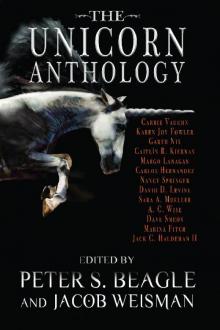 The Unicorn Anthology.indb
The Unicorn Anthology.indb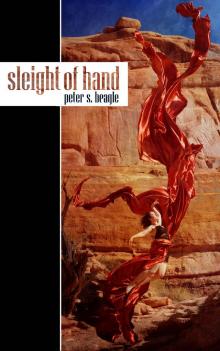 Sleight of Hand
Sleight of Hand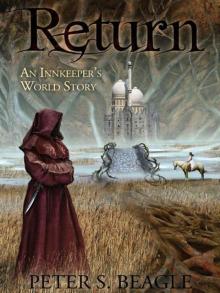 Return
Return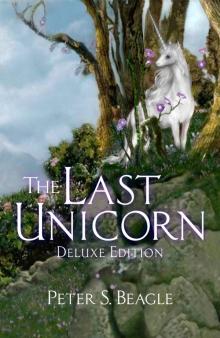 The Last Unicorn
The Last Unicorn Two Hearts
Two Hearts Mirror Kingdoms: The Best of Peter S. Beagle
Mirror Kingdoms: The Best of Peter S. Beagle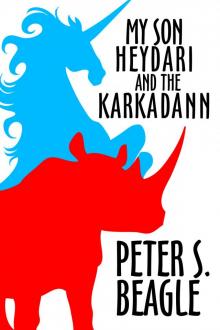 My Son Heydari and the Karkadann
My Son Heydari and the Karkadann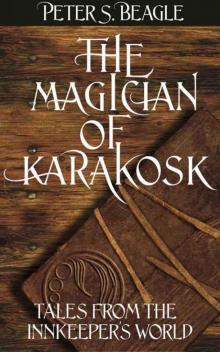 The Magician of Karakosk, and Other Stories
The Magician of Karakosk, and Other Stories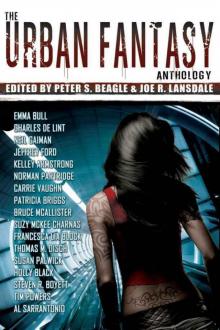 The Urban Fantasy Anthology
The Urban Fantasy Anthology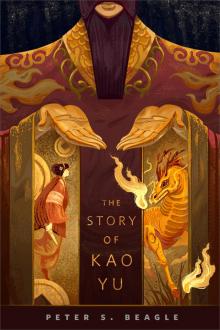 The Story of Kao Yu
The Story of Kao Yu The Karkadann Triangle
The Karkadann Triangle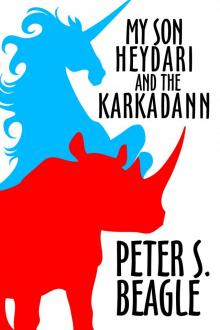 My Son and the Karkadann
My Son and the Karkadann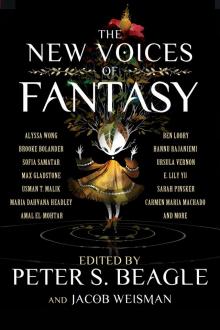 The New Voices of Fantasy
The New Voices of Fantasy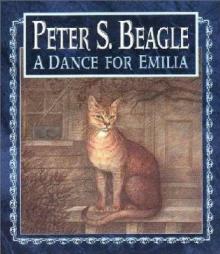 A Dance for Emilia
A Dance for Emilia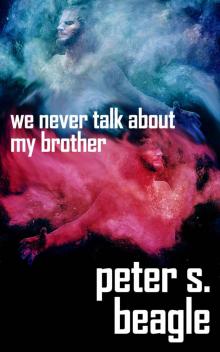 We Never Talk About My Brother
We Never Talk About My Brother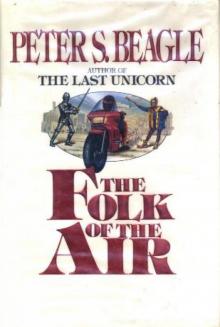 The Folk Of The Air
The Folk Of The Air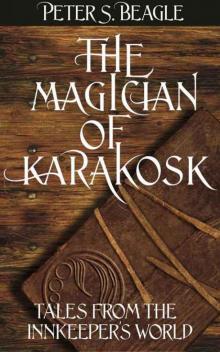 The Magician of Karakosk: Tales from the Innkeeper's World
The Magician of Karakosk: Tales from the Innkeeper's World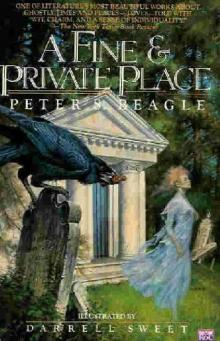 A Fine and Private Place
A Fine and Private Place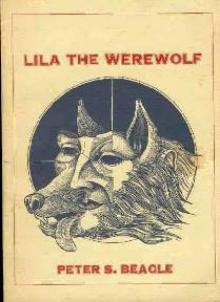 Lila The Werewolf
Lila The Werewolf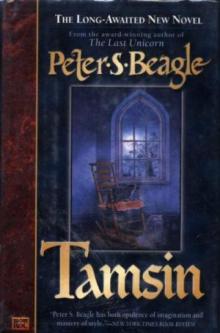 Tamsin
Tamsin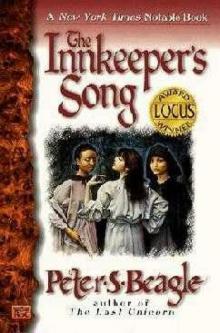 Innkeeper's Song
Innkeeper's Song